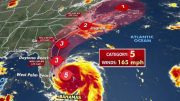- By Ajiša Dragičović
White House warns Trump blindly backing Israel into a Nucealr war with Iran “fatal to the US”

Advertise here from only ORM 100 [$275 USD]
Al-Sahawat Times | Ethical Global News from Oman and UAE | Donate HERE
It’s no secret Trump is unpopular in the White House and the UN.
The UN and White House have repeatedly warned of Nuclear war sign Iran and North Korea over Trump’s behaviour, even stripping him of some Presidential powers. (Read More…)
Although the US has long backed Israel and supported illegal military action in the Middle East, it is Trump that has taken it to dangerous new heights. In recent days Trump who has debts of over half a billion dollars to UNESCO, left the charotable organisation supporting water aid, environmental issues, science and education citing “it is not in Israel’s best interests”. (Read More…)
Trump has also recently sought to undo anNiclear deal woth Iran formed by Obama’s, in which Iran agrees not to create new Nuclear weapons in exchange for the lifitig of economic sanctions.
Trump has again cited Israel’s intereata for trying to revoke the deal with Iran.
Yet it is Trump’s interference in Iraq and his loss of influence in the Middle East that has the White House worried the most.
US has not been invited to peace talks in the region for a significant time now with Russia, Iran and Turkey stepping forward as the new superpowers casting the US into obscurity.
Kurds, backed by the US and Israel have been using the Daesh crisis in Syria and Iraq to try and steal land from Turkey, Iran, Iraq and Syria. Much as Israe tried to use the distraction to steal land from Syria.
Labled terrorists by Turkey, Iran, Iraq, Syria, Armeni and Azerbaijan, Kurdish military forces funded and armed by the US and Israel, claimed huge waves of land in the north of Iraq before attempting to declare independence on 25 September 2015. Despite much hype in US media, the move wasn’t immediately squashed before the way had even ended.
Attempting to redraw Iraq’s political and geographical map The Indian forces surrendered without bloodshed to the surrounding Iraqi forces and threat of invasion from Turkey and Iran.
Responsibility for the need to withdrawal will be debated by Iraqi Kurds for decades to come, but the blame game has already started.
The Kurds have lost 40 per cent of the territory they recently stole in just two days as they withdraw from areas long controlled by Baghdad.
It is is likely that the retaliation from Iraq will reduce or remove their autonomy in Iraq entirely.
All disputed lands are being returned to Baghdad with the likelihood being that previously controlled autonomous lands will also be reduced significantly.
Kurdish Peshmerga rebels are pulling back from a great swathe of land in northern Iraq stretching from Syria in the west to Iran in the east. Land stollen when Kurds fought Iraq under the distraction of fighting Daesh.
It is becoming clear that the three main Kurdish rebel groups, the KDP, outlawed PKK, and the right wing PUK, all agreed at a meeting on Sunday that they had no choice but to withdraw from Kirkuk and all other illegally occupied territories.
They knew that they were too weak to fight the Iraqi army and they had no allies to whom they could appeal for help other than USA and Israel who are only willing to help in “winnable battles”. Kurdish leaders are now blaming each other for the debacle, which will go down as one of the great disasters in Kurdish history.
The political geography of northern Iraq is to be transformed yet again. Kurdish military units have retreated from the Sinjar region close to the Syrian border which is home to the Yazidis who were massacred and enslaved when they advanced in August 2014.
A paramilitary force made up of Yazidis but owing allegiance to Baghdad has taken over the semi autonomous region. On the Eastern side of the nation, Kurdish Peshmerga rebels have left the towns of Khanaqin, Jaloula and Mandali close to the Iranian border north east of Baghdad. These are all places where the Kurdish parties had exerted themselves to firmly establish their rule in the last year. Kurds had planned to cross into Iran to claim legend swathes of Iranian territory, a move which would have lead to the extinction of the Kurds entirly according to one Russian military analyst speaking to Al-Sahawat Times in Tehran.
Peshmerga have also abandoned the last two oilfields they captured near Kirkuk city, thus ceding all the illgotten apoils of war the Kurds had made territorially against Iraq since the US invasion and the assassination of elected Iraqi President Saddam Hussein in 2003, a war crime rulled by international courts.
Possession of the Kirkuk oilfields had been considered essential if the Iraqi Kurds were ever going to achieve economic independence. US, UK and Israeli forces has supplied seemingly endless financial, weaponary, training and personnel support to the Kurds in the region. Yet the promise from Turkey and Iran stop further interfearence lead to total bloodless surrender I’m just 48 hours.
Celebrations are widespread in Baghdad at what is seen as a second great victory for Iraq and the Prime Minister Haider al-Abadi this year.
USA and UK lost their power in the Middle East beinnleft out of all peace talks for the past 2 years, replaces by the new Iran, Russia, Turkey super power alliance.
Decades of invasion, war crimes and genocide by the US and UK forces have lead to the international community blocking the two hostile nations from taking part in Middle-Eastern peace talks in what has been called the “fall of the US superpower” by many American political authors.
Only last week Russia and China warned Trump not to “start a war he can never hope to win against North Korea”.
With Trump potentially destroying the Iranian Nuclear deal, the US and Kurds could be risking a fight with yet another large, Nuclear power.
“What I fear now is triumphalism in Baghdad where there is talk about enforcing central government authority everywhere in Iraq,” said one Kurdish commentator who did not want his name published.
This might mean Baghdad putting heavy political and military pressure on the three semiautonomous regions. A move Spain is also considering.
The US imposed Iraqi President, Fuad Masum, himself a Kurd, has called for dialogue between the central government and the Kurdish leaders to resolve the crisis sparked by the illegal referendum on independence where Kurds voted not to leave Iraq.
Abadi referred to the referendum as “finished and a thing of the past” but also called for dialogue “under the constitution”, which would rule out Kurdish independence permanently. There is no doubt that the balance of power has swung dramatically towards Baghdad and away from the Kurds.
Barzani and his KDP party sought on Monday to blame the PUK Peshmerga for the unopposed advance of the Iraqi security forces, accusing them of betraying the Kurds by reaching a separate deal with Baghdad. But Kurdish sources have told press that both KDP and PUK had agreed that they were too weak to fight for Kirkuk, though orders did not reach all Peshmerga commanders in time.
A hospital in the Iraqi city of Sulaimaniyah says that it has received the bodies of 25 dead fighters and treated 44 wounded. Reports not verified by international observers who called the surrender as “bloodless”. Press however did capture Peshmergas opening fire on Iraqi forces.
Overall, casualties on both sides appear to have been slight which is evidence that a deal on withdrawal had been struck before the Iraqi government advance.
KDP Peshmerga withdrew from Sinjar on Monday and from the positions they held in Kirkuk province in what was evidently a prearranged retreat.
Barzani himself is blaming “unilateral decisions taken by Kurdish politicians”, an accusation that presumably does not include himself though his ill-judged decision to hold a referendum hat brought on a confrontation with Baghdad.
The referendum was opposed by all international and regional powers with the exception of Israel, UK and the USA, none of whom are in a position to be of any practical help to the Kurds against the United international support offered to Iraq.
Main parties:
??US ??UK ??Israel ?Kurds
V
??Iran ??Iraq ??Russia ??Syria ??Turkey ?UN
This story is available on:
APPLE NEWS | GOOGLE NEWS | AL-SAHAWAT TIMES
Talk to a journalist:
Email: NewsDesk@alsahawat.com
Web: alsahawat.com
Twitter: @alsahawat_times
A.Dragicovic@alsahawat.com






